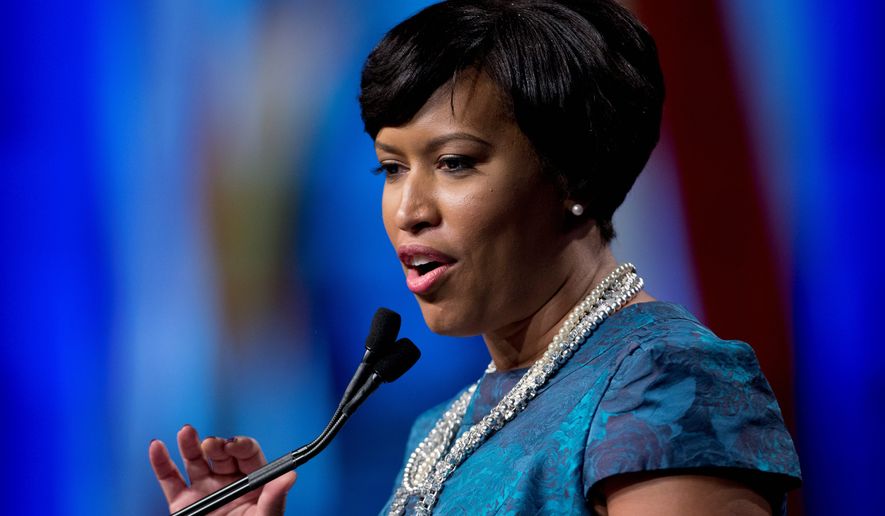Since signing an anti-discrimination law that legal counsel had warned could be unconstitutional, D.C. Mayor Muriel Bowser now is moving to introduce a bill to fix the problematic legislation.
The law was intended to extend protections to workers by banning employers from discriminating against employees based on their reproductive health care decisions. But critics, including conservative activist groups, warned the measure would illegally require organizations to provide insurance coverage for abortions and other reproductive health care procedures regardless of whether they violate the organizations’ religious beliefs.
Ms. Bowser signed the law Jan. 23, triggering a wave of outcry from religious groups and setting the conservative advocacy group Heritage Action for America to work lobbying Congress to block its implementation.
A week later, Ms. Bowser has sought to introduce emergency legislation that would clarify language in the law to state explicitly that it does not require any specific type of insurance coverage.
“The mayor is going to work with the [D.C.] Council and make sure it is constitutional,” said spokeswoman LaToya Foster.
The original bill bans an employer from discriminating against an employee based on “the individual’s or a dependent’s reproductive health decision making, including a decision to use or access a particular drug, device or medical service, because of or on the basis of an employer’s personal beliefs about such services.”
SEE ALSO: D.C. joins effort to release the wrongly convicted after exonerations climb nationwide
The draft declaration circulated to D.C. Council members Friday states that emergency legislation is needed to provide a clarification that the law “shall not be construed to require an employer to provide insurance coverage related to a reproductive health decision.”
It’s unclear if the emergency legislation goes far enough to address the concerns of groups that challenged the bill.
Before he left office, former Mayor Vincent C. Gray sent a letter to the D.C. Council ahead of their unanimous vote on the bill, calling it “legally problematic” and apprising them of the concerns raised by the Office of the Attorney General. He noted that religious and political organizations might have strong grounds under the First Amendment and the federal Religious Freedom Restoration Act (RFRA) to challenge the bill.
“If the Council wishes to adopt this Bill or similar legislation, it should clarify the Human Rights Act’s existing exemption for religious and political organizations to ensure that the exemption protects the religious and political liberty interests that the First Amendment and the RFRA are designed to secure,” Mr. Gray wrote in the Dec. 2 letter.
Ms. Bowser’s proposed emergency legislation does not carve out exemptions for religious or political organizations; rather, it adds the clause that the act “shall not be construed to require an employer to provide insurance coverage related to a reproductive health decision.”
Officials from Alliance Defending Freedom, a conservative Christian legal group opposed to the original bill, were uncertain whether the emergency legislation would address all their legal concerns.
SEE ALSO: Family of Carol Glover, who died of smoke inhalation on D.C. Metro, files $50M lawsuit
“We would have to examine that and see what exactly the impact of it would be,” said ADF senior counsel Casey Mattox. “This was a mistake from the beginning, and rushing through another emergency answer now is not likely to solve all the legal problems.”
Though a draft of Ms. Bowser’s emergency proposal was circulated Friday, D.C. Council officials said it was not received in time to be included on the agenda for the council’s Tuesday meeting.
In the meantime, the original reproductive health act has yet to be transmitted from the D.C. Council secretary to Congress. All D.C. laws must undergo a congressional review period during which federal lawmakers could seek to block a law through a disapproval resolution — a rarely successful tactic.
Heritage Action for America officials met with members of Congress last week to gauge members’ opposition to the law and found strong support for introduction of a disapproval resolution, said spokesman Dan Holler.
Mr. Holler noted that a number of advocacy groups that work to advance conservative values and religious beliefs are headquartered in the District and could be affected by the law.
“This puts a lot of them in a very uncomfortable position,” he said.
• Andrea Noble can be reached at anoble@washingtontimes.com.




Please read our comment policy before commenting.